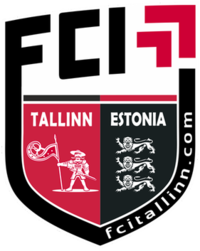FCI Tallinn
 | |||
| Full name | FC Infonet Tallinn[1] | ||
|---|---|---|---|
| Founded | 29 January 2002 | ||
| Ground | Infonet Lasnamäe Stadium | ||
| Capacity | 500[2] | ||
| Manager | Vjatšeslav Smirnov | ||
| League | II liiga | ||
| 2022 | II liiga, 1st | ||
| Website | http://www.fcinfonet.ee | ||
|
| |||
FCI Tallinn (FC Infonet Tallinn) is an Estonian football club, based in Lasnamäe, Tallinn.
Formed in 2002, the club played in the Estonian top flight Meistriliiga from 2013 to 2017, and won the league in the 2016 season. In 2017, the club merged with Levadia, with the main team and first reserve disbanded, the second reserves, playing in the II Liiga, the fourth level, inherited the club's name.
History
[edit]The club was founded in 2002. Before the 2011 season, the club merged with Esiliiga club FC Atletik. They finished the 2011 season in second place, but were beaten in the promotion play-offs by Kuressaare 1–5 on aggregate. Infonet won the 2012 Esiliiga season and were promoted to the top tier Meistriliiga. Infonet finished its first season in the Estonian top division with 6th place.
On 13 July 2015, Infonet beat amateur side Virtsu 36–0 in a 2015–16 Estonian Cup match, equalling Arbroath's 130-year-old record for the largest margin of victory.[3]
Infonet made their European debut in the 2016–17 UEFA Europa League, but were defeated by Scottish Heart of Midlothian 3–6 on aggregate in the first qualifying round.
Infonet won their first Meistriliiga title in the 2016 season, amassing 80 points.[4]
After the 2017 season, it was announced that the club would merge with Levadia and be automatically relegated to the II liiga.[5]
Stadium
[edit]The club's home ground was the Infonet Lasnamäe Stadium, also known as the Lasnamäe KJH Stadium. The stadium was built in 2003 and resurfaced in 2016. It has a capacity of 500.[2] The team played their UEFA matches at A. Le Coq Arena.[6][7]
Players
[edit]Reserves and academy
[edit]Personnel
[edit]Managerial history
[edit]| Dates | Name |
|---|---|
| 2011 | |
| 2011–2017 | |
| 2017 |
Honours
[edit]- Meistriliiga
- Champions: 2016
- Esiliiga
- Winners: 2012
- Estonian Cup
- Winners: 2016–17
- Estonian Supercup
- Winners: 2017
Statistics
[edit]League and Cup
[edit]| Season | Division | Pos | Pld | W | D | L | GF | GA | GD | Pts | Top goalscorer | Cup | Supercup |
|---|---|---|---|---|---|---|---|---|---|---|---|---|---|
| 2011 | Esiliiga | 2 | 36 | 19 | 11 | 6 | 101 | 47 | +54 | 68 | Third round | ||
| 2012 | 1 | 36 | 26 | 5 | 5 | 94 | 33 | +61 | 83 | Third round | |||
| 2013 | Meistriliiga | 6 | 36 | 10 | 8 | 18 | 36 | 56 | –20 | 38 | Fourth round | ||
| 2014 | 5 | 36 | 19 | 9 | 8 | 80 | 44 | +36 | 66 | Semifinalist | |||
| 2015 | 4 | 36 | 17 | 11 | 8 | 50 | 32 | +18 | 62 | Fourth round | |||
| 2016 | 1 | 36 | 24 | 8 | 4 | 74 | 33 | +41 | 80 | Third round | |||
| 2017 | 4 | 36 | 20 | 5 | 11 | 103 | 47 | +56 | 65 | Winner | Winner | ||
| 2018 | II Liiga | 2 | 26 | 18 | 3 | 5 | 71 | 29 | +42 | 57 | Quarterfinalist |
Europe
[edit]| Season | Competition | Round | Opponent | Home | Away | Agg. |
|---|---|---|---|---|---|---|
| 2016–17 | UEFA Europa League | First qualifying round | 2–4 | 1–2 | 3–6 | |
| 2017–18 | UEFA Champions League | First qualifying round | 0–2 | 0–1 | 0–3 |
References
[edit]- ^ "Club". FCI Tallinn. Archived from the original on 17 September 2021. Retrieved 14 February 2017.
- ^ a b "Infoneti Lasnamäe staadion". Estonian Football Association. Archived from the original on 8 August 2017. Retrieved 7 July 2017.
- ^ "Estonian team thrash rivals 36-0 equalling Arbroath FC's 130 year old record for biggest win". Daily Mirror. 16 June 2015. Archived from the original on 17 June 2015. Retrieved 16 June 2015.
- ^ "Eesti meister on Infonet". Soccernet.ee. 4 November 2016. Archived from the original on 18 January 2021. Retrieved 4 November 2016.
- ^ "FC Levadia ja FCI Tallinn alustasid ühinemisprotsessi". Delfi Sport. 4 November 2017. Archived from the original on 1 December 2017. Retrieved 25 November 2017.
- ^ "UEFA switch Infonet' Europa League first leg clash to Tynecastle". FC Infonet. 21 June 2016. Archived from the original on 10 August 2016. Retrieved 21 June 2016.
- ^ "Match summary". UEFA. Archived from the original on 13 July 2017. Retrieved 7 July 2017.
